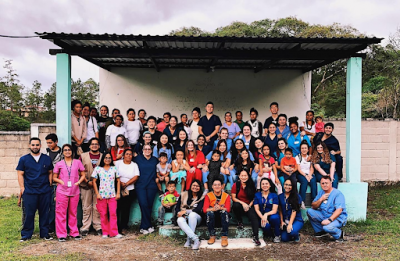Boston University Global Medical Brigades chapter is gearing up for a trip to Guatemala this May — its first in-person brigade in over two years — following a series of cancellations caused by the COVID-19 pandemic.

BUGMB is an organization of students and medical professionals who work in rural and under-resourced communities to implement “sustainable health systems,” according to the Global Brigades website.
President and former Treasurer, Matias LaTorre, a junior in the Sargent College of Health and Rehabilitation Sciences, is looking forward to the Guatemala trip after the pandemic took its toll on the club, noting that the trip is “a sign of hope for the club and the world as a whole.”
“Morale has definitely been the biggest challenge, but I genuinely do think that with this upcoming brigade, that’ll shift pretty rapidly, and I think we’re already seeing that shift happen,” LaTorre said. “As we get closer and closer, people are just more excited, and I think it’ll go really well.”
The club typically goes on two brigades per year — one in January and one in May — but switched to a virtual model last year after the 2020 trip was canceled due to the pandemic.
Instead, BUGMB conducted “telebrigades” in Honduras and Greece, connecting with patients and providers via Zoom and fundraising with healthcare providers.
“It was a very good model,” LaTorre said. “For being 100% virtual, we were able to learn a lot even if we weren’t on the field.”
Vice President Emma Kraus, a junior in CAS and 4-plus-1 master’s student in the School of Public Health, understands the importance of a careful return to in-person brigades.
“I’m glad BU has waited this long until we know for sure that it’s safe, not just for us but for the community,” Kraus said. “A lot of these communities we are going to are rural and we are actually the biggest COVID risk for them.”
Fundraising Co-Chair Amira Eldesouky, a sophomore in Sargent College, said she appreciated the learning experience of the telebrigades but is looking forward to an in-person experience.
“I learned … super fascinating things, but I didn’t feel like I was making as big of an impact as I had hoped going into this,” Eldesouky said. “I just think it’s going to be more of a connection and it’s going to be more fun but the education aspect is still going to be there.”
The trip to Guatemala will happen between May 15-21. For La Torre, a son of Colombian immigrants, the opportunity to assist a Spanish-speaking community hits “close to home.”
“It’s kind of what I want to do in my future as well so personally I think getting back into the field and getting back into the Latin American community is something I’m very excited about,” LaTorre said.
The first day of a brigade typically involves working with cultural competency, language development and goal setting as well as communicating with local providers and the community to determine what would best suit their needs. On the second day, brigaders assist with the community’s infrastructural needs, like sanitation work.
“There’s a lot of different things we do, but it’s solely based on what the community needs and what the community wants,” LaTorre said. “We’re not just going to go in and build a random thing that’s going to have no use.”
The following days focus on medical clinic work, including helping with triage, appointments, pharmacy work and shadowing physicians.
“It’s just a really good time to both connect with the community, develop interpersonal skills and then also learn a little bit about the care setting, especially in the kind of rural settings that we usually go to,” Latorre said.
The care provided by the clinics is free for the community, with the brigaders facilitating this by organizing fundraisers.
Eldesouky said she hopes that, in addition to raising money, the events help spread the club’s message.
“That money will be taken and put to good use when we go on the brigade,” Eldesouky said. “The money we’re raising is being used to get supplies …. I mean toothbrushes, toothpaste, glasses, BandAids, a bunch of things that could help in any way possible.”
For Eldesouky, helping underprivileged communities is an opportunity to reflect on everything we take for granted.
“We don’t understand our privilege until we are taken out of our privilege and put into somewhere else,” Eldesouky said. “We all need to recognize that it is such a privilege to live in a place that provides clean water and good food. ”










































































































